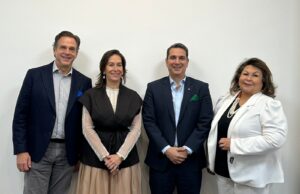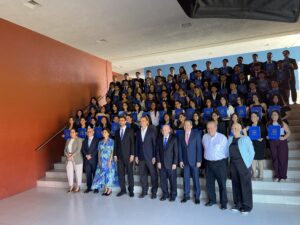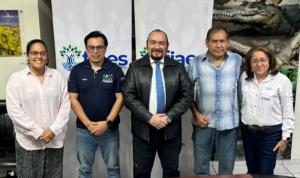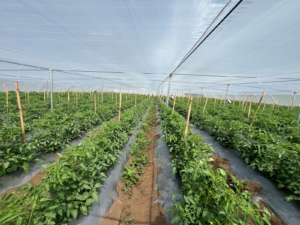
Under its Shared Value Creation philosophy, Nestlé makes significant progress on inclusion and gender equality in El Salvador, Increasingly recognizing and valuing the abilities and talents of their collaborators, as well as their contribution to society. For Nestlé, diversity and inclusion go beyond reputation or social responsibility. The company aims to accelerate efforts by including policies, initiatives and projects to build a more diverse team and culture.
“We firmly believe that the genuine and authentic practice of diverse spaces strengthens the strategies, culture and growth of the company. Policies of inclusion and gender equity are a way to promote respect for the various ways of thinking and doing”, said Andrés Calatroni, General Manager of Nestlé El Salvador.
Nestlé has been a pioneer in prioritizing the promotion of an inclusive work environment where all its employees can thrive and reach their full potential. In line with this commitment, the company has implemented a number of initiatives to promote diversity, inclusion and gender equality at all levels of the organization.
At present, the gender balance indicator for Nestlé El Salvador is 53% women and 47% men; and 55% of women hold leadership positions.
“At Nestlé El Salvador, many of our employees are an example of the culture of inclusion and equality. From women who have joined the company as interns and are now part of our roster, or collaborators who thanks to their performance and an inclusive environment now occupy management positions. They are certainly a sign of a vision we seek to maintain for greater opportunities for all”, said Carla Carranza, Human Resources manager at Nestlé El Salvador.
The practice of these inclusive and gender-equal policies spans the entire Nestlé value chain, being practiced in different sustainability programs and transcending office environments to field work. An example of this is the Nescafé Plan, whose objective is to help boost agro-entrepreneurship within the coffee sector in Central America, and which has made significant progress specifically in Honduras in terms of youth inclusion and human rights.
Today, Plan Nescafé has positively impacted more than 28,000 coffee-growing families in Honduras. And aligned with the Sustainable Development Goals (SDGs) #8 related to decent work, and SDG #16 related to human rights, the company promotes inclusion, diversity and fair practices throughout its value chain. Under a holistic strategy, Nestlé is working with agencies such as USAID and Swiss Contact to promote programs that empower young people and women through the Nescafé Plan.
“This initiative has an integral approach that not only contributes to the sustainability of the coffee industry in Honduras, but also promotes entrepreneurship and human rights in the producing communities of the country”, said Kim Waigel, Director of Communications and Corporate Affairs at Nestlé Central America, who will participate in the 2024 CSR and Sustainability Week in El Salvador, presenting the success story of the Nescafé Plan in the implementation of inclusion and gender equality actions in communities.
The sustained practice of initiatives and policies around diversity and inclusion have led Nestlé to achieve in recent years a presence in the main ranks and indicators of measurement of policies for employment inclusion and gender equality.
For example, the Bloomberg Gender Equality Index where in 2023 Nestlé achieved an overall score of 78.5%, higher than 68.5% from the previous year and the average score of the index of 73%.

As well as the ranking presented this year by the Great Place to Work Institute, which evaluates the internal policies of companies in the development and welfare of their employees, including policies for labor inclusion, and where Nestlé El Salvador was ranked in the top 3 companies in 2024 for the best places to work.
In the face of these advances, some of the programs and initiatives that continue to build a culture of diversity, inclusion and equity at Nestlé are:
- Signing of the Charter of the Global Network on Business and Disability of the International Labour Organization (ILO).
- Membership in the World Economic Forum’s ‘Association for Racial Justice in Business’.
- Policy against discrimination, violence and harassment in the workplace, including annual pay equity reviews to eliminate conditions that create gender differences.
- Member of the Women’s Empowerment (WEps) principles programme, a tool for delivering corporate results on gender equality dimensions in the 2030 Agenda and the UN Sustainable Development Goals.
- Global Guide Against Domestic Violence, to break down stigma and communication barriers in each member of the organization, regardless of gender, implementing different psychosocial and support mechanisms.
- Gender-neutral global parental support policy, recently launched and that has revolutionized not only the company’s workforce by its innovation and openness, has not only set precedents but also inspired other companies to implement policies of a similar scope.
- Internal and external diversity and inclusion campaigns (pride, race and ethnicity, international women’s day, international person for capacity).







